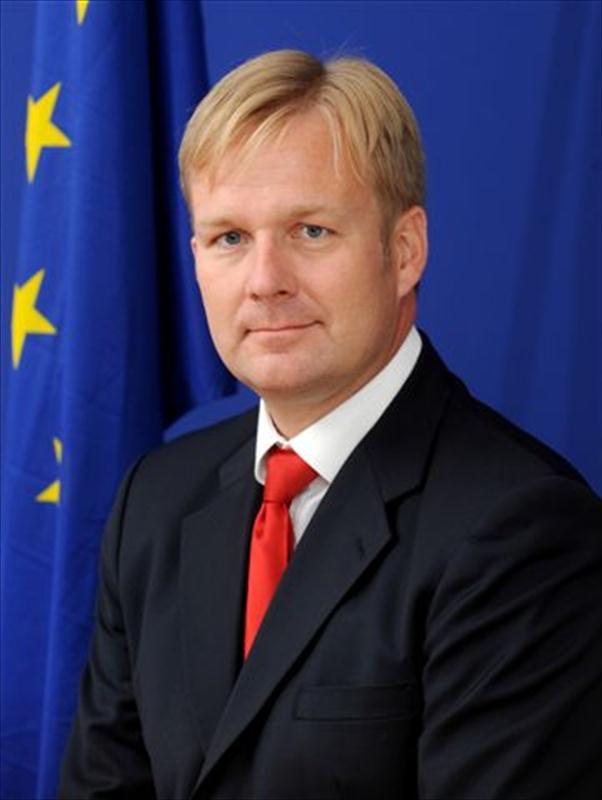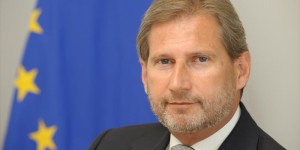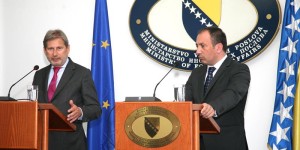Ambassador Peter Sorensen identified transport infrastructure and energy as sectors where Bosnia and Herzegovina should invest, in a speech to the conference ‘Road to Recovery – response to the economic crisis’ in Sarajevo.
Thank you very much. It is indeed an honour to be with you here today, in the midst of the election campaign around the country, to speak about something that we consider a real issue for Bosnia and Herzegovina. Namely, the issue of the economic recovery. Let me say that there is no quick fix to this issue. The panellists you will have today here are the experts. They are in this middle of this issue; they know how to deal with it and how they dealt with it in other places. So, what I offer you in my introductory remarks today is some observations that we, from the EU, have made in how Bosnia and Herzegovina could be looking at this issue in weeks, months, and perhaps years to come.
Looking at the figures for Bosnia and Herzegovina it is obvious that right now Bosnia and Herzegovina is not dealt the best hand when it comes to development and economic recovery. When we look at the region, it is not comfortable. And that just underlines that these dire straits force the country, the region to think very hard on how to handle these issues, how to force the political consensus necessary and how to move things forward.
It is very clear that fiscal restraint, adherence to the currency board arrangements and international community support seems to have helped the Bosnia and Herzegovina maintain its macroeconomic stability. But there is a need for more than that. In 2010 it looked like the crisis was over, but growth has remained sluggish throughout the year and a similar situation continued in 2011, so at the end of the year, BiH GDP was still not back at the pre-crisis level.
As the situation in Europe has deteriorated, I have to admit, an adverse impact of these developments has begun to materialize. Thus, low domestic demand in Bosnia and Herzegovina accompanied by reduced BiH exports – which has hitherto been one of the main contributors to the country’s economic growth – has led to pessimistic expectations in terms of growth in 2012. We understand that it will be very low or actually no growth at all.
As in many EU member states, such dire straits call for careful consideration about a country’s economic policy. It calls even for better planning and smart savings and investments. So far, Bosnia and Herzegovina’s economy has been heavily reliant on both external demand and external financing. Domestic resources were traditionally used to finance a large and many-levelled administration, and numerous social benefits.
As the available global financing diminishes, it is unlikely that it will be available at the pre-crisis levels – that will not be available for some time to come. Therefore if Bosnia and Herzegovina wants to revive its economy, it will undoubtedly have to find more resources internally in order to enhance growth and create new jobs.
In parallel to this we have observed a number of additional challenges:
First and foremost, Bosnia and Herzegovina will have to speed up its preparations for the upcoming accession of Croatia to the European Union. Bosnia and Herzegovina is currently at risk of throwing away a market of which Bosnia and Herzegovina has been and still is an integral part. Unfortunately, Croatia’s accession to the EU is likely to interrupt the exports as Bosnia and Herzegovina is not progressing fast enough to meet European standards for most of the animal-origin and plant-origin products.
If one were to be blunt one would say that sloppy preparation on Bosnia and Herzegovina’s part risks jeopardizing jobs and investments in these sectors. What we can do now is to work to the maximum with Bosnia and Herzegovina to try to obtain the necessary authorisations from the EU, but also to find alternatives for this agriculturalist sector. This is not easy and, therefore we are back to the responsibility of the authorities to get Bosnia and Herzegovina ready for Croatia’s accession.
Another point is that investment-pooling in the region may help to stimulate growth and employment. Joint activities could also contribute to growth. Just one example of this could be regional tourism development between Bosnia and Herzegovina, Montenegro and Croatia. Another one could be development of infrastructure, I will only mention the Ionic-Adriatic highway. Other projects could pool these countries together and thereby attract investors, bigger foreign investors, to exercise these options on their own.
We also may take note that the public sector needs to create more space for investment projects. The country has significant assets still in public hands, including in strategic sectors like communications, energy etc. It is clear that privatization of such assets needs to be considered both for fiscal consolidation as well for improving the way in which they are managed. We understand that decisions on moving forward would need to take into account conditions prevailing on the market, but we are equally confident that even in a time of crisis some of those assets are attractive enough to secure proper value for their eventual sale. Obviously, this would require that the process of privatisation is carried out in a transparent and very professional way. Equally important, it would be essential to reinforce the role and the independence of the regulators which will play an even more important role in the market after privatization. These are methods that helped many of our Member States to revive a number of their sectors and economies, we are sure that Bosnia and Herzegovina will undoubtedly need to do the same.
In addition to letting the public sector create more space for investment projects, the authorities will need to adhere to prudent fiscal policies and refrain from further increases in the current expenditures. I am sure that these points will be mentioned by some of the speakers later on today; several times I am also sure! But it is also important. The upcoming IMF Stand-By Arrangement, we hope, shall provide a sound basis for improved fiscal discipline in this regard. It would also, together with EU macro-financial assistance, provide necessary funding for implementation of long-needed structural reforms.
Looking forward – two sectors stand out for potential investment. We are focusing on them, and we are working with the authorities on what we can do to make them attractive. First and foremost, there is transport infrastructure. This has a key economic role in increasing opportunities for business development and foreign investments. Better access to the market, a greater range of supply goods and lower purchase costs all come with good infrastructure transport. Indeed Bosnia and Herzegovina with the rest of the region will need to improve the transport infrastructure to bring long-term stability and economic prosperity. One could say provocatively: who wants to invest in a country if it takes days to get there or to get the products in and out of there.
But also, investments in the energy sector are always welcome. They are vast projects that in return generate opportunities for new jobs, both while they are implemented but also afterwards. Bosnia and Herzegovina is currently the largest net exporter of electricity in the region. But this is mainly because the industrial consumption in the country is still at a low level. The country should not hold back the investments in this sector, it should build up and use the capacities that are there and by that stimulate economic growth.
So just to conclude my remarks: investments, foreign as well as domestic are needed. Bosnia and Herzegovina needs to get ready for Croatia’s EU accession to preserve current as well as to develop future jobs in agriculture; Bosnia and Herzegovina needs to unlock the investment space from public sector occupation; it needs to get the regulators up and running with the necessary independence and operational requirements; it should focus on energy and transport and in doing so Bosnia and Herzegovina is not alone in these endeavours. The EU stands ready to support, both through budgetary support and on the grand plan through IPA funds – and we are here with the biggest Delegation in the world to help you to do so, so let’s tackle the challenge together. Thank you very much for listening.




